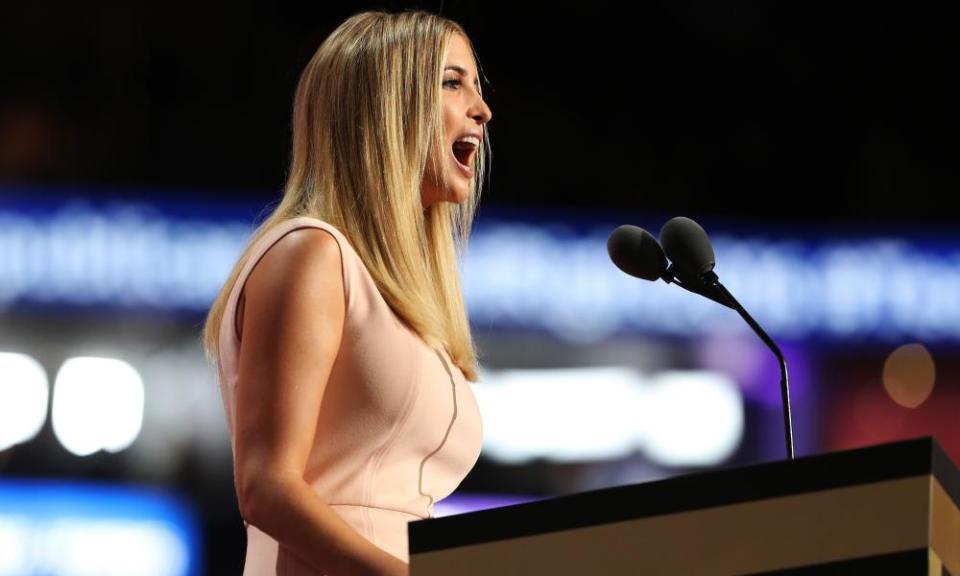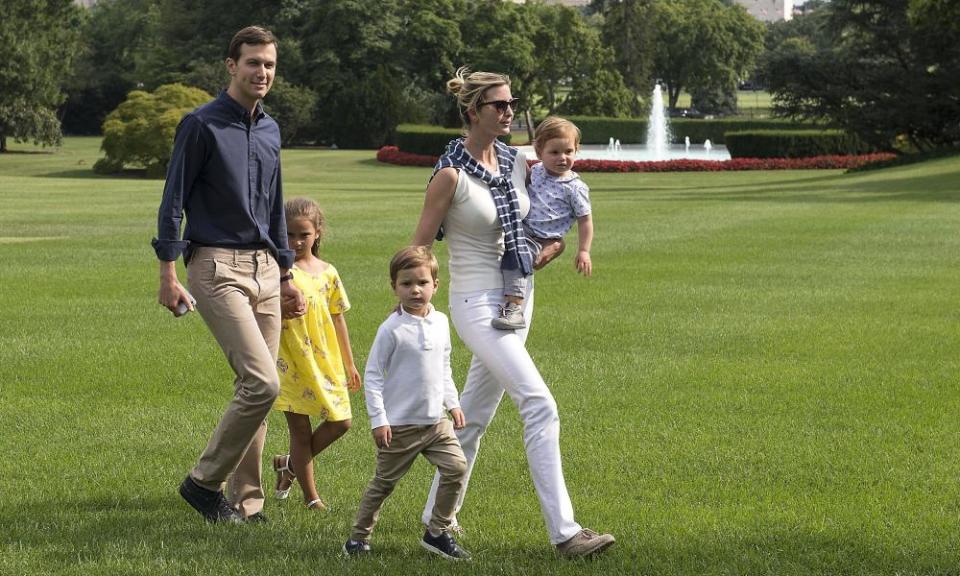'Where did you go, Ivanka?' How the first daughter's family leave plan fizzled
At the Republican national convention, Ivanka Trump pledged to fight for mothers. But her proposal was rebuffed amid the Republican tax overhaul
Read more on the Guardian’s in-depth series The Mother Load

“As a mother myself, of three young children, I know how hard it is to work while raising a family. And I also know that I’m far more fortunate than most.”
Those were the words of Ivanka Trump at the 2016 Republican national convention, moments before her father took the stage to accept his party’s nomination for president. Standing at the podium before a crowd of thousands in Cleveland, with millions more watching across America, Ivanka touted Donald Trump as a champion of working women while vowing to fight for gender equality “right alongside of him”.
Ivanka seemed perfectly fit for the moment, speaking both from her own experience as a mother of three children and a high-profile CEO whose brand has centered on women in the workplace.
But nearly one year into the Trump administration, Ivanka’s portfolio on a host of women’s economic issues – from paid family leave to equal pay and affordable child care – remains largely devoid of policy victories. Her efforts have mainly amounted to public advocacy, seemingly far remote from her father’s agenda.
Last week, her push for an expanded child tax credit paid minor dividends during the Senate debate over tax reform. But critics said her preferred approach to the issue would largely favor wealthy Americans, while an alternative that would have enabled more working families to receive the benefit was rebuffed by Republicans in Congress.
“If her priority or her plan was to create and advance policies domestically and internationally that would advance women’s opportunity in the workplace, they haven’t come to fruition,” said Kelly Dittmar, an assistant professor of political science at Rutgers University and scholar at the Center for American Women and Politics at the Eagleton Institute of Politics.
Leading up to the tax vote, Ivanka was in India touting paid family leave plan that would require employers to offer six weeks of paid leave for new parents. Republicans meanwhile moved toward a far narrower proposal as part of their tax legislation, effectively ignoring a White House budget blueprint released in May that adopted Ivanka’s model.
Paid family leave arguably ranks among the most glaring examples of the gender gap in the US when compared with other countries.
The US is the only outlier among 41 developed countries that does not require any paid leave for new parents, according to the the Organization for Economic Cooperation and Development (OECD).
Several countries, including Austria, Bulgaria, the Czech Republic, Hungary, Japan, Latvia, Lithuania, Norway and Slovakia, guarantee over a year’s worth of paid leave. Estonia offers the most support, allocating more than a year and a half of paid leave to new parents.
While there has been no notable momentum in the Republican-led Congress to address paid family leave in a substantial way, a modest proposal by the Nebraska senator Deb Fischer was included in the tax plan passed by the Senate early Saturday along a party-line vote.
The provision aims to incentivize companies to provide up to 12 weeks of paid parental or medical leave by offering up a tax credit capped at 25% to employers who voluntarily do so.
But even that minor olive branch was not included in a tax plan passed by the House of Representatives last month, and it remains to be seen if Republicans in both chambers will agree to leaving it in a final bill. The provision has also been sharply criticized by Democrats and progressive groups as offering yet another tax break for companies rather than rallying behind a clear mandate that employers offer paid family leave.
The paid leave tax credit would only be temporary, and even some conservative economists have argued it would have little impact.
Ivanka, who has maintained paid family leave remains on the administration’s agenda, instead poured her efforts during tax reform negotiations into expanding what is known as the child tax credit.
After initially suggesting a deduction for childcare expenses, which critics said would disproportionately favor high-income households like her own, Ivanka threw her support behind a measure authored by Senators Marco Rubio and Mike Lee that would double an existing $1,000-per-child tax credit.
The senators put forward an amendment that would help offset the costs of what would have amounted to an $87bn expansion of the child tax credit by cutting the corporate tax rate to 21%. The Republican tax plan had instead proposed slashing the corporate tax rate to 20%, down from its current 35%, at the request of Trump.
Ivanka, who engaged in several discussions on the issue with Rubio, Lee and a handful of other Senate Republicans, used her platform to push for the plan. But even there, her clout proved limited as her father, through a White House spokesman, swiftly objected to the measure days before the Senate’s tax vote. While the tax bill passed by Senate Republicans still doubles the non-refundable tax credit from $1,000 annually per child to $2,000, the Rubio-Lee amendment to expand the credit to millions of poor families was voted down.
Ivanka still praised the passage of the tax plan, tweeting on Monday: “Last week the Senate brought us one major step closer to historic #TaxReform. We now look forward to Congress reconciling the two bills and signing the Tax Cuts & Jobs Act into law together!”
‘Women won’t believe her’

Outside groups aligned with Democrats said Ivanka had once again fallen short on the promises she has made to women by hailing a bill containing vast tax cuts for the wealthiest Americans and doing little in the end to improve the economic conditions of working families.
Democrats have pushed a bill with far broader ramifications than Ivanka’s proposal, seeking to provide up to 12 weeks of leave for family and medical purposes with partial pay. The legislation, introduced by the New York senator Kirsten Gillibrand and known as the Family Act, would establish a nationwide insurance program to pay for the leave, funded by employer and employee payroll contributions.
Emily’s List, which works toward electing pro-choice Democratic women, likened Ivanka’s efforts for women to window-dressing. “Like everything this administration does, Ivanka Trump and the Republican party’s childcare tax credit benefits the wealthy while doing almost nothing to make childcare more affordable for working families,” Alexandra DeLuca, a spokeswoman for the group, said.
“Ivanka can claim that she is a champion for women, but as long as she continues to prop up an administration that tries at every turn to roll back the clock on women’s rights, women won’t believe her.”
But even as Ivanka’s performance remains under constant scrutiny, she has slowly stepped back from the spotlight and taken on a more diminished role when compared with the earlier months of the Trump administration.
As the special counsel Robert Mueller has escalated the federal inquiry into potential collusion between the Trump presidential campaign and Russia, Ivanka and her husband, Jared Kushner, have assumed a quieter presence in the West Wing. Kushner remains a person of interest in the investigation, stemming from his own series of previously undisclosed contacts with the Russians.
According to a New York Times report published last month, the White House chief of staff, John Kelly, has discussed the possibility of Ivanka and Kushner leaving the White House by the end of the year. (Kelly disputed he had ever “contemplated getting rid of Jared and Ivanka”.)
Ivanka has often grown visibly frustrated by the backlash she has incurred on account of her father.
When a Saturday Night Live sketch pilloried Trump’s elder daughter as “complicit” in the most controversial aspects of father’s agenda, Ivanka responded: “I don’t know what it means to be complicit, but I hope time will prove that I have done a good job and much more importantly, that my father’s administration is the success that I know it will be.”
While speaking alongside the German chancellor, Angela Merkel, at a panel in April, Ivanka was booed by the crowd when she claimed her father was an advocate of women’s rights. She also baffled women’s groups by supporting her father’s decision to terminate an Obama-era rule designed to close the gender pay gap by better understanding patterns of wage discrimination broken down by both gender and race.
Some nonetheless argue the responsibility Ivanka often bears is not commensurate with her position. “Putting any singular blame on Ivanka Trump for these policies not going through would be unfair,” said Kelly Dittmar of Rutgers University.
“The accountability on these issues ultimately rests with those who are making the policy, in this case … the president and the heads of various executive agencies, as well as Congress.”
Dittmar nonetheless said it was fair to evaluate whether Ivanka has been able to influence the policies of her father’s administration. “We often look to women in any administration to be the ones to stand up for women’s issues,” she said. “Obviously men and women equally need to take on these issues as important,” Dittmar added. “The difference with Ivanka is she’s touted these issues. She’s said these are mine and these are my priorities.”
‘When women succeed, we all succeed’
In the lead-up to an entrepreneurs’ summit in the Indian city of Hyderabad last month, billboards of Ivanka were erected around town, reading: “When women succeed, we all succeed.”
It was a theme Ivanka propounded in her keynote address to the summit. “As a former entrepreneur, employer, and executive in a male-dominated industry, I have seen first-hand that all too often, women must do more than their male counterparts to prove themselves at work, while also disproportionately caring for their families at home,” Ivanka said.
“After my father’s election, I saw an opportunity to leave my businesses for the privilege of serving our country and empowering all Americans – including women – to succeed.”
She ran down a list of initiatives the White House was proposing to improve upon the status quo for American women, especially those in business. “Our administration is advancing policies that enable women to pursue their careers and care for their families,” she said.
With additional reporting by Michael Safi in Hyderabad

